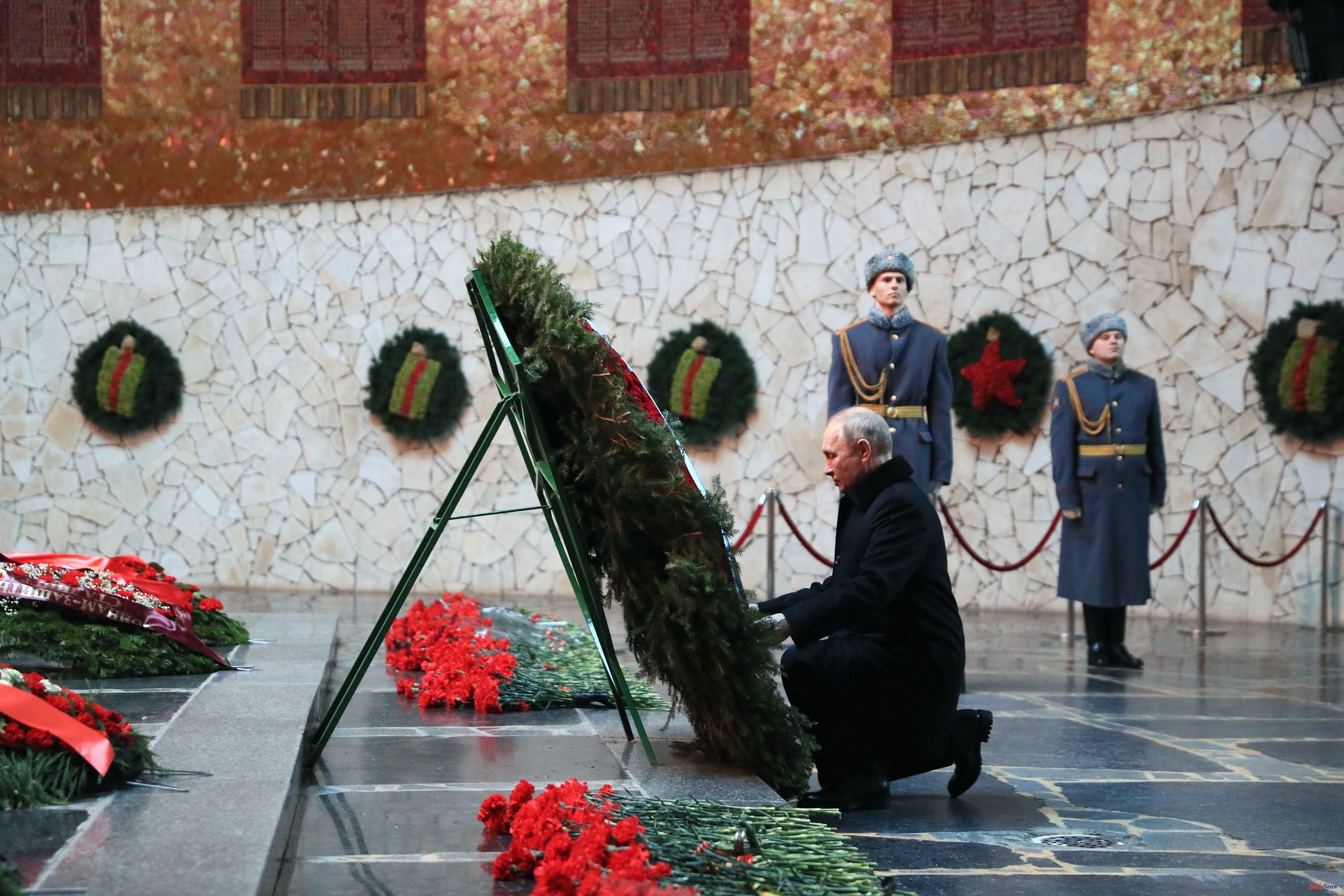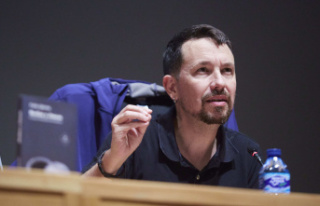Russia is struggling on the Ukrainian front, but today it remembers how it led Adolf Hitler to his first surrender in 1943. Vladimir Putin evoked the heroism of the Soviet army that defeated Nazi forces at Stalingrad 80 years ago, saying Russia is now poised to defeat to a Ukraine that according to him is in the hands of a new incarnation of Nazism. "Unfortunately, we see that Nazi ideology in its modern form and manifestation again directly threatens the security of our country," Putin told an audience of army officers and members of the city's patriotic and youth groups. "Over and over again we have to repel aggression from the West. It is unbelievable but it is a fact: again we are being threatened with Leopard tanks bearing German crosses."
This time Russia is not the invaded but the invader. But that didn't matter on a cloudy Thursday afternoon in Volgograd, a city that changes its name a couple of times a year, on Victory Day and on anniversaries like this one, to reincarnate itself as what it was called until 1961: Stalingrad.
Putin drew on what he said was the spirit of the defenders of Stalingrad in his speech to explain why he thought Russia would prevail in Ukraine. He said the World War II battle is a symbol of "the indestructible nature of our people."
While Volgograd played at being Stalingrad, Putin looks back on his 23 years in power trying to escape the ghost of the also endless Leonid Brezhnev, the Soviet leader who presided over the stagnation of the USSR, but who ended his long term mired in a war conflict. impossible to win in Afghanistan.
As in 1941, Russia is at war, although at the moment he does not want to call it by its name. Meanwhile, Stalin has ceased to be a debatable word. The old Stalingrad, heroic as always, inaugurated a new monument to the Soviet dictator, whose purges, famines, concentration camps and abuses are well known to the Russians.
Victory over the Nazis served to weld the seams of a Soviet Union that had inherited imperial appetites. Stalin's memory was erased from the map by his successor, Nikita Khrushchev, the same one who handed over Crimea to Soviet Ukraine. Putin recaptured it for Russia in 2014. In recent years Russian politicians - and even school textbooks - have emphasized Stalin's role as a successful wartime leader. After all, this is how the Soviet Union became a superpower. And this is how Russia is fighting now to not stop being an empire.
The criticisms that were put against Stalinism after the opening of the files of shame are silenced again with the fascinating roar of the war ceremonies, that kind of social morphine that the Putin regime dispenses with greater art and care. Planes flew overhead over the city - which was virtually reduced to rubble during the fighting against the Germans - as modern tanks and armored vehicles and a few World War II ones passed by as thousands thronged the streets to watch. the parade.
"Those who push European countries, including Germany, into a new war with Russia and hope to win a battlefield victory over Russia, apparently do not understand that a modern war with Russia will be very different for them," the leader warned. Russian. "We do not send our tanks to its borders, but we have the means to respond, and not only with the use of armored vehicles, everyone must understand that," threatened the Russian leader, who last year put his armored vehicles in Ukraine after weeks of denying to plan an invasion.
Stalingrad was a key battle: it broke the backbone of the German forces between 1942 and 1943. But the cost was enormous: it was the bloodiest of World War II with a million casualties on both sides. So when Putin finished speaking, teasing Stalingrad with his Ukraine venture, the audience gave him a standing ovation, though no one today knows exactly how much of his neighboring country would be enough for the Kremlin.
True to tradition, the Russian leader laid flowers at the grave of the Soviet marshal who oversaw the defense of Stalingrad and visited the city's main memorial complex, where he held a minute's silence to honor those who died in the battle. The focal point of the ceremonies was at the Mamayev Kurgan memorial complex, on a hill overlooking the Volga River dominated by a hulking statue of a woman wielding a giant sword. She embodies the homeland, the same one that Ukrainians and Russians shared for decades.
Putin's visit to Volgograd and the appearance of another Stalin sculpture are eloquent on the threshold of the anniversary of the start of the war in Ukraine (in Russia it is called a special military operation), which Ukrainians and Russian pacifists consider a Barbarossa operation by setback with which Putin wants to crown himself as a historical figure and consolidate his power in the absence of alternatives. "He doesn't want to be like Brezhnev, he can't be like Stalin," Serguei Shelin wrote last September.
What the Russians have noticed in 2022 is not new greatness, but a repression never seen before. The return of political trials, censorship, exile, propaganda and silent purges. And an increasingly evident crisis.
"The Brezhnev regime, at the end of its existence, renounced the attitudes of its founder, stumbled on the Afghan adventure and finally collapsed. And something similar is planned now, but perhaps with even less predictable consequences," Shelin said. "In the third decade of his reign, Putin fulfilled his secret dream and is trying to fight and rule like Stalin, but at the same time he has at his disposal a Brezhnev-style civil and military apparatus, and he does not possess the Stalinist technique of manipulation. and terror".
According to the criteria of The Trust Project












